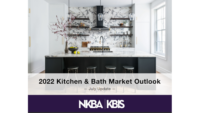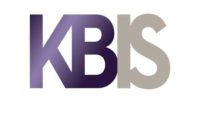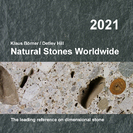HACKETTSTOWN, N.J. — In its July update to the Kitchen & Bath Market Outlook, the National Kitchen & Bath Association (NKBA) revised its 2021 industry sales projection upward to $170.9 billion, up by a substantial 21.4% from 2020’s $140.8 billion in kitchen and bath spending and nearly 8% higher than the initial estimate for the year.
New construction K&B spending is now expected to exceed 2020 by an impressive 28.5%, as builders attempt to keep pace with substantial demand. Meanwhile, K&B remodeling is expected to climb by 12.5%.
The update provides a comprehensive review of current industry conditions as well as macroeconomic factors — such as consumers opening their homes to workers post-pandemic and stimulus checks — likely to impact business.
“This update is very encouraging and confirms the ongoing robust performance of the design and remodeling industry,” said Bill Darcy, NKBA CEO. “This very strong sales forecast is attributable to pent-up demand for new home construction, easing COVID disruptions and a sea change in consumer behavior. People will continue to work from home in some capacity, fostering renovation of their space to meet their evolving needs. A tight inventory of homes for sale is also encouraging homeowners to stay put and renovate. That’s all good news for our industry.”
Darcy cautioned, however, that there are a few bumps in the road: Home prices continue to rise, and the cost of building materials is still high — a combination that’s excluding some potential buyers from the market; the employment picture still hasn’t fully recovered to pre-pandemic peaks, and supply-chain disruptions continue to delay jobs and make product sourcing a challenge. “But most indicators suggest the thriving K&B market will continue,” he added.
The industry should see double-digit increases in both kitchen and bath spending. This is a reversal from the industry’s 3.8% decline in 2020, which was driven by an 8.6% loss for remodeling and stagnant growth of just 0.5% for new construction during the pandemic.
Bathroom spending will rise by 22.3% in 2021 and will be sparked mainly by gains in new construction, while kitchen spending will increase by 20.4%, led by stronger gains in remodeling.
Among the report’s other key findings:
High-End Soars Even Higher: Although forecasts for low and mid-range project spending have each been revised upward, it’s the high-end that will shine. It’s now expected to surge by over 28% compared to 2020 (beating the initial 19.8% projection), as pent-up demand, robust savings and impressive house appreciation encourage homeowners to go the extra mile.
Job Recovery Lags: Not everyone is in a position to act. Although 14 million jobs have been recovered since the pandemic lows, total U.S. employment is still more than 8 million jobs below peak levels. At the current rate of job creation, it would take more than a year to fully recover. The unemployment rate, however, is receding to traditional levels, as some have left the job market entirely and are no longer counted.
Tailwinds for Housing Starts: Starts are expected to grow by 18% in 2021, a sharp upward revision over the initial forecast for the year. The spike in starts is partially owing to a plunge in available resale inventory. This portends a continued hot market for at least the short term, but relentless home inflation is beginning to flash warning signals, as more consumers are being priced out of the market.
Home Improvement Tops Discretionary Spending: Nearly 1 in 3 homeowners plan to boost their home-improvement discretionary spending this year, well above the 1 in 5 (or fewer) who plan such increases for eating out, entertaining, travel or health. In fact, the average home-improvement project price point is 25% higher than last year.
Kitchen & Bath Are Top Choices: For those planning home improvements this year, kitchens and primary baths rank #1 and #2, respectively, among a dozen home areas offered. More than half (55%) said they planned to remodel their kitchen, while 40% cited their primary bathroom. Exterior (37%), patio/deck (29%) and primary bedroom (29%) round out the top five.
Methodology:
The data presented in this report is compiled from a variety of sources: U.S. Census American Housing Microdata, National Apartment Association (NAA) Spending, the National Association of Realtors, Moody’s Analytics, Home Innovation Research Labs (HIRL) data, and John Burns Real Estate Consulting’s home improvement estimates and forecasts. In addition, a survey was conducted among 530 consumers to better understand spending behaviors as the COVID-19 pandemic subsides. The homeowners were over age 24, and only projects of $1,000 or more were included.







